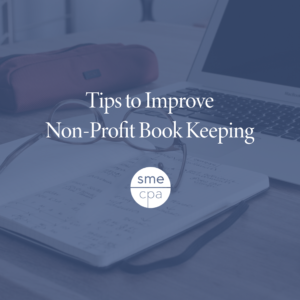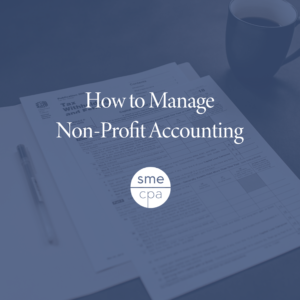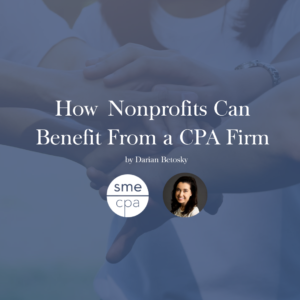CATEGORIES
SME CPA BLOG
ARCHIVE
The market value of property and equipment often exceeds book value, especially for fixed assets that appreciate (rather than depreciate) in value or if your company uses accelerated depreciation methods. But the reverse sometimes occurs, too. When book value exceeds market value, a write-off may be required under U.S. Generally Accepted Accounting Principles. Understanding Book…
Read MoreManaging and overseeing funds is mission-critical for any non-profit. While an experienced non-profit accountant is a great resource for helping you manage the big-picture financials, perform audits and prepare annual reports, your organization’s treasurer or bookkeeper is still a critical player in keeping the financial wheels turning. If you’re a non-profit bookkeeper or an Executive…
Read MoreIf you’re the executive director of a non-profit organization, you’re likely tasked with keeping all the initiatives moving forward, planning for future campaigns, and managing the business aspects of the organization. But a non-profit isn’t a standard business. There are many objectives, strategies, and processes that differ for 501(c)(3) and 501(c)(6) organizations, compared to the…
Read MoreNon-profit organizations are valuable businesses that serve to further a social cause or provide a public benefit. They are great at driving economic development in virtually every sector of society. However, non-profits face rigorous accounting, reporting, and regulatory requirements. Meeting these stipulations can often be burdensome and if you’re left doing this alone, it can…
Read MoreIf you recently filed your 2016 income tax return (rather than filing for an extension) you may now be wondering whether it’s likely that your business could be audited by the IRS based on your filing. Here’s what every business owner should know about the process. Catching the IRS’s eye Many business audits occur randomly,…
Read MoreBusinesses generally issue year-end financial statements to let investors and lenders evaluate their financial health. But proactive stakeholders — including the company’s CEO and board of directors — may want more than one “snapshot” per year of financial results. Interim statements let stakeholders know how a company is doing each quarter or month, but they…
Read MoreThe statement of cash flows highlights the sources and uses of cash. It’s arguably the most misunderstood and underappreciated part of a company’s annual report. Here’s an overview of how this statement is organized and what the Financial Accounting Standards Board (FASB) has recently done to make it more user-friendly. Cash flows from operations The…
Read MoreIf your business issues audited financial statements and follows a calendar year end, your external auditing procedures have already begun. At a minimum, you’ve signed an engagement letter, sent over preliminary financial statements and allowed your CPA to observe any year end physical inventory counts. But there are some steps you can still take to…
Read MoreDid your company undergo a major strategic shift in 2016? If so, management may need to comply with the updated rules for reporting discontinued operations that went into effect in 2015 for most companies. Discontinued operations typically don’t happen every year, so it’s important to review the basics before preparing your year-end financial statements. Narrower…
Read MoreA landmark financial reporting update is replacing about 180 pieces of industry-specific revenue accounting guidance with a single, principles-based approach. In May 2014, the Financial Accounting Standards Board (FASB) unveiled Accounting Standards Update (ASU) No. 2014-09, Revenue from Contracts with Customers. In 2015, the FASB postponed the effective date for the new revenue guidance by…
Read More









